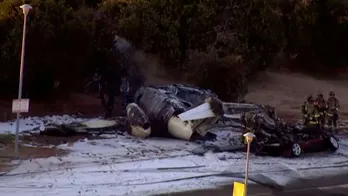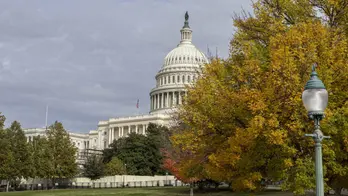In Michigan, where every vote counts, Arab Americans are turning away from Biden
The chant rang out loud and clear.
"Free, free, Palestine... Long live Palestine."
And so did another.
"Biden, Biden, you can't hide. We charge you with genocide."
At a recent rally on downtown Detroit's riverfront, thousands called for a ceasefire in the Israel-Hamas war, which began after Hamas militants killed hundreds of Israelis on Oct. 7. Israel has responded by attacking the Gaza Strip, which Hamas governs. The conflict has left more than 1,200 Israelis and 11,300 Palestinians dead according to Israeli and Gaza officials.
Speaking at the event, Michigan Democratic State Rep. Abraham Aiyash said the U.S. backing Israel signals a disregard for Palestinian lives in a way that goes directly against the country's founding principles.
"America, you promised the world that all men and women are created equal. Yet somehow we find billions of dollars to dehumanize Palestinians," said Aiyash, who is the Majority Floor Leader in the Michigan House.
Rally goers expressed anger at the U.S.'s stance in the war: The Biden Administration has vowed to militarily support Israel, and vetoed a United Nations resolution that called for a ceasefire, though it has softened its stance in recent days by allowing a separate resolution to pass, asking for extended humanitarian pauses.
While advocates of a ceasefire say it would give much needed relief to civilians living in Gaza, the U.S. and Israel argue a pause in the fighting would give Hamas time to regroup and prepare more attacks.
Israel has said it won't agree to a ceasefire unless Hamas releases the more than 240 hostages it is holding in Gaza.
If you asked rally goers like Arab American business owner and civil rights activist Nasser Beydoun, President Biden has so far failed on this issue.
"Where's his humanity?" he asked. "Is he that much of a Zionist that the Palestinian lives don't matter to him?"
Beydoun is a former Republican turned Democrat who is currently running for Michigan's open U.S. Senate seat. He supported Biden in 2020. But now, he feels that the president and Democrats are failing him and other Arab Americans, which could have a political cost.
"He lost a constituency that voted overwhelmingly for him in Michigan," he said. "And if he wants to see reelection, he needs Michigan. And right now he doesn't have it. And I don't think he'll ever come back from it."
Michigan's large Arab American and Muslim American populations turned out big for Biden in 2020, helping him clinch the battleground and solidify his win over Trump for the presidency. AP reported that 64% of Muslims nationwide supported Biden in 2020, while 35% supported Trump. And in heavily Arab American counties in Michigan, voters went for Biden by a little less than 70%.
Biden's margin of victory in Michigan was 154,000 votes. The state is home to more than 200,000 registered voters who are Muslim and 300,000 people claim ancestry from the Middle East and North Africa. Michigan's Arab American population includes Muslims and Christians, along with recent immigrants and families whose ancestors arrived in the late 1800s alike.
But the Israel-Hamas war is throwing the support of Michigan's large Arab American population into doubt for Democrats.
Because they feel the White House is disproportionately supporting Israel at the cost of the lives of Palestinians, leaders in Muslim American communities have been encouraging others to not put Biden down on their ballot in 2024.
"They are being instructed that Biden is the issue here, that he is forming the policy and that the blood is on his hands," said Nazita Lajevardi, a political scientist at Michigan State University who studies both attitudes towards Muslims in the U.S. as well as Muslim-American public opinion. They are also consuming Arab media publications and social media posts where Lajevardi says the message is "The way to end this type of atrocity is to vote him out of office."
One of those disillusioned by the Biden administration is Saba Saed, a student at Michigan State University.
"I've never really trusted the American government system, especially when it comes to Palestine, because they failed us so many times," said Saed, who was born in the West Bank and spent half of her life there. "But I never thought in my life that it would be this bad, this awful."
Lajevardi said that sentiment has rung true for Muslims across the country. She says that in her online surveys of Muslim leaders and mosques, she's seen skyrocketing disapproval of Biden since the start of the war — and at a rate higher than that of Trump, who famously called for "a total and complete shutdown of Muslims entering the United States," during his first campaign for president in 2015.
It is precisely because of that disapproval that crosses party lines that Lajevardi says a growing number of people feel it is not worth voting for either political party, Democratic or Republican.
"Because how are they being represented substantively? How are their interests actually being advocated for by Democrats? I think that's a very fair question that Muslims are asking right now," Lajevardi said. "Not voting for a Democrat in 2024 is not as costly as some may assume it is for Muslims."
Another student at Michigan State, Yusuf Abbas, said he's also felt "let down" by the White House and Democrats. Abbas voted for Biden in 2020, but seeing Biden's response to the war, Abbas doesn't hold out any real hope that the U.S. will help create meaningful change in the Middle East.
"It was never a priority for any American administration to, to try to solve the conflict in a long lasting manner, in a just manner that works for both Palestinians and Israelis, and Biden is effectively no different," said Abbas, whose family is Palestinian.
So, for someone who was never really eager to talk politics — let alone the Israeli-Palestinian conflict — Abbas has now taken it upon himself to be more vocal about the war. As the war has taken a toll on his and his friends' mental health, Abbas said the university's Arab cultural student groups have come together in this difficult time.
"I believe in discussing things and talking about it," he said. "We can sit down and maybe have a serious conversation about it and discuss what's going on, because it hurts both of us. If you're Jewish or you're Israeli, or if you're Palestinian or Muslim or Arab, it hurts both sides."
For Michigan House Majority Floor Leader Aiyash, he's using the skills he learned while organizing for Barack Obama's 2008 presidential campaign to try to force Biden to act — and encourages other Arab Americans to do the same.
"We do have political power," he told attendees in closing remarks at the Detroit rally. "We do have the ability to influence an election."
And he addressed the Democratic establishment and Biden directly.
"And if you are not going to take that into consideration, and are simply using platitudes while your policies perpetuate violence and harm, we will not stand by it."
Disclaimer: The copyright of this article belongs to the original author. Reposting this article is solely for the purpose of information dissemination and does not constitute any investment advice. If there is any infringement, please contact us immediately. We will make corrections or deletions as necessary. Thank you.







